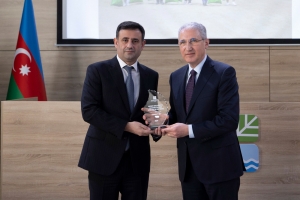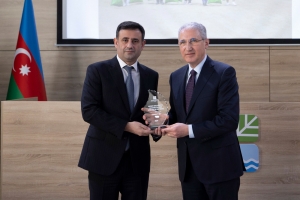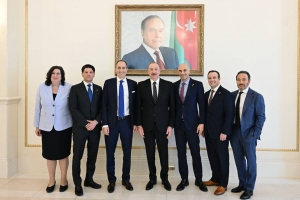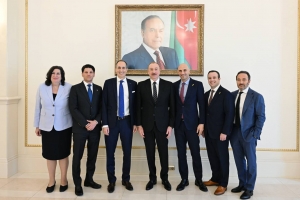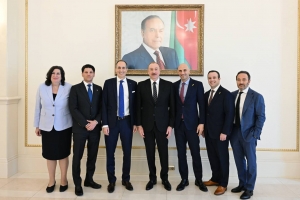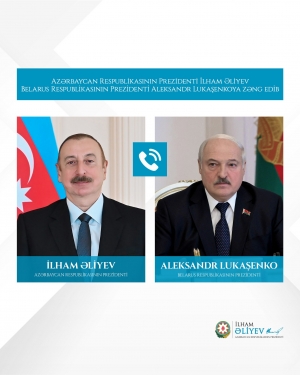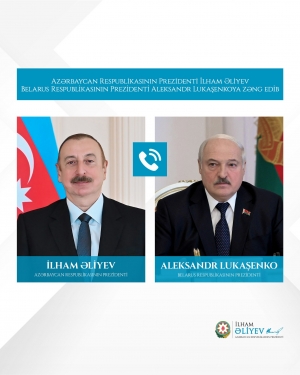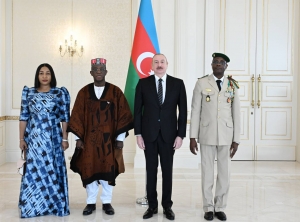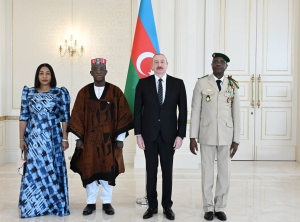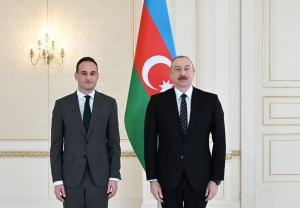Super User
ЗАО AzerGold награждено в номинации «Лучший партнер 2024 года» в области экологии
Министерство экологии и природных ресурсов Азербайджана наградило ЗАО AzerGold в номинации «Лучший партнер по поддержке экологических проектов в рамках корпоративной социальной ответственности».
Награда, представленная министром экологии и природных ресурсов Мухтаром Бабаевым, была вручена заместителю председателя Правления, главе комитета по корпоративной социальной ответственности Хайяму Фарзалиеву.
ЗАО было удостоено этой награды в 2024 году за вклад в охрану окружающей среды с проектами «Реинтродукция редких растений, произрастающих в Дашкесанском районе» и «Чистый Дашкесан». Об этом сообщает “Caspian Energy Media” со ссылкой на AzerGold.
“AzerGold” QSC ekoloji sahədə “2024-cü ilin ən yaxşı tərəfdaşı” nominasiyası üzrə təltif edilib
“AzerGold” QSC Ekologiya və Təbii Sərvətlər Nazirliyi (ETSN) tərəfindən 2024-cü ildə “Korporativ sosial məsuliyyət çərçivəsində ətraf mühit layihələrində ən yaxşı tərəfdaş” nominasiyası üzrə təltif edilib.
Ekologiya və təbii sərvətlər naziri Muxtar Babayev tərəfindən təqdim edilən mükafatı “AzerGold” QSC-nin İdarə Heyəti sədrinin müavini, Korporativ Sosial Məsuliyyət Komitəsinin sədri Xəyyam Fərzəliyev qəbul edib.
QSC bu mükafata 2024-cü ildə icra etdiyi “Daşkəsən rayonunda bitən nadir bitkilərin reintroduksiyası” və “Təmiz Daşkəsən” layihələri ilə ətraf mühitin mühafizəsinə verdiyi töhfələrə görə layiq görülüb. Bu barədə “Caspian Energy Media” “AzerGold”-a istinadən xəbər verir.
Ильхам Алиев принял соучредителя и члена правления Израильского экономического форума
27 января Президент Азербайджанской Республики Ильхам Алиев принял соучредителя и члена правления Израильского экономического форума Джонатана Миcнера.
Об этом сообщает “Caspian Energy Media” со ссылкой на официальный сайт главы Азербайджанского государства.
İlham Əliyev İsrail İqtisadi Forumunun həmtəsisçisi və İdarə Heyətinin üzvünü qəbul edib
Azərbaycan Respublikasının Prezidenti İlham Əliyev yanvarın 27-də İsrail İqtisadi Forumunun həmtəsisçisi və İdarə Heyətinin üzvü Conatan Misneri qəbul edib.
Bu barədə “Caspian Energy Media” Prezidentin Mətbuat xidmətinə istinadən xəbər verir.
Ilham Aliyev received Co-Founder and Board Member of Israel Economic Forum
On January 27, President of the Republic of Azerbaijan Ilham Aliyev received Jonathan Missner, Co-Founder and Board Member of the Israel Economic Forum.
“Caspian Energy Media” reports with reference to the official website of the President of Azerbaijan.
Ilham Aliyev made a phone call to Aleksandr Lukashenko, President of the Republic of Belarus
Ilham Aliyev, President of the Republic of Azerbaijan, made a phone call to Aleksandr Lukashenko, President of the Republic of Belarus, on January 27.
The head of state congratulated Aleksandr Lukashenko on his re-election as President of the Republic of Belarus and wished him success in his duties.
During the telephone call, the two leaders reaffirmed their confidence in the continued development of friendship and partnership between Azerbaijan and Belarus and exchanged views on the prospects for bilateral cooperation. “Caspian Energy Media” reports with reference to the official website of the President of Azerbaijan.
Ильхам Алиев позвонил Президенту Республики Беларусь Александру Лукашенко
27 января Президент Азербайджанской Республики Ильхам Алиев позвонил Президенту Республики Беларусь Александру Лукашенко.
Глава государства поздравил Александра Лукашенко с переизбранием на пост Президента Республики Беларусь, пожелал ему успехов в деятельности.
В ходе телефонного разговора главы государств выразили уверенность, что дружественные и партнерские отношения между двумя странами будут и впредь развиваться по восходящей линии, провели обмен мнениями о перспективах сотрудничества.
Об этом сообщает “Caspian Energy Media” со ссылкой на официальный сайт главы Азербайджанского государства.
Ильхам Алиев принял верительные грамоты новоназначенного посла Гвинеи в нашей стране
27 января Президент Азербайджанской Республики Ильхам Алиев принял верительные грамоты новоназначенного чрезвычайного и полномочного посла Гвинейской Республики в нашей стране Умара Канде.
Посол вручил главе государства cвои верительные грамоты.
Об этом сообщает “Caspian Energy Media” со ссылкой на официальный сайт главы Азербайджанского государства.
Ilham Aliyev received credentials of Guinea's newly appointed ambassador
On January 27, President of the Republic of Azerbaijan Ilham Aliyev received the credentials of Oumar Kande, incoming Ambassador Extraordinary and Plenipotentiary of the Republic of Guinea.
“Caspian Energy Media” reports with reference to the official website of the President of Azerbaijan.
Ilham Aliyev received credentials of Slovenia's newly appointed ambassador
On January 27, President of the Republic of Azerbaijan Ilham Aliyev received the credentials of Gorazd Renčelj, incoming Ambassador Extraordinary and Plenipotentiary of the Republic of Slovenia.
The Ambassador presented his credentials to the head of state.
The conversation touched upon cooperation in the energy sector, with a focus on the delivery of Azerbaijani gas to the Slovenian market as a significant step in advancing bilateral ties. The meeting also included an exchange of views on the prospects for Azerbaijan-European Union relations.
“Caspian Energy Media” reports with reference to the official website of the President of Azerbaijan.




